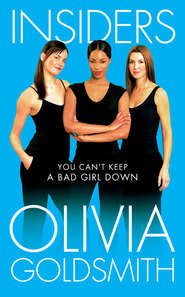По всем вопросам обращайтесь на: info@litportal.ru
(©) 2003-2025.
✖
Young Wives
Автор
Год написания книги
2018
Настройки чтения
Размер шрифта
Высота строк
Поля
“I’ll spend the rest of my life living with the shame.” Gently, tenderly, he stroked her hair. She couldn’t help but shiver. Her face was fine, her hair was fine, all of her was fine. Her mind went blank and that was a relief. Any guilt, any doubt she had, she ignored.
It felt so good to be sheltered in his arms. Angie wanted to rub first one cheek and then the other against his chest, the way cats did to mark their territory.
The Soprano meant nothing to him. Maybe this whole bizarre time could be written off, forgotten. Maybe it was just a lapse and Reid had learned a lesson. But at the moment Angie couldn’t think. This wasn’t about thinking.
There was some noise out in the living room, the sound of something toppling over, but thudding, not crashing. One of the men yelled something, and then a woman’s voice answered him. Angie froze. It couldn’t be. It was. The voice. The Soprano.
The door swung open and Lisa stood there. Angie, feeling caught out and guilty, took a step back from her husband. Reid took a step back from her as well. “What the hell is going on?” Lisa asked, clearly furious as she looked from Angie to Reid.
Angie felt ashamed. After all, she’d burned up hours of Lisa’s time talking about how she hated this man. She stared at Lisa, who looked very, very good; her hair was blonder, and she seemed taller and thinner than ever. “You got my message,” Angie began, but at the same time Reid said, “How did you—”
“What the hell are you doing here?” Lisa said to Reid.
“It’s my house,” he answered, defensive as a child.
“Lisa, it’s okay,” Angie said. “We’ve started to talk things over.”
“The hell you are,” Lisa said, still looking at Reid. “I ought to report you to the department of narcissism. They’d come right in here and shut you two down.”
“What are you talking about?” Angie asked.
“Oh, shut up,” Lisa said, violently. “Do you know how sick I am of listening to you whine?” She looked at Reid. “What do you think you’re doing to me?” she asked.
It took that long for Angie to get it. But then she did—big time. She looked from Reid, who averted his eyes, to Lisa, who stared insolently at her. The blue dress, the shoes, the advice to stay away—now it all made sense. Size four. The Soprano. Why, in all those hours of talking, of complaining and bitching, had she never noticed Lisa’s voice? Angie shook her head, pushed past Lisa, and walked out into the living room. “That’s it,” she told Sean and Thomas. “Wrap it up. I’m out of here.”
16 (#ulink_b838ad62-1fe7-5ff0-be46-fdd81b070bf4)
In which Michelle, Brownie Queen, has to let them eat cake
Michelle hadn’t been able to sleep since the bust. She was exhausted, but every time she started to drift off, she’d start awake, a cold sweat covering her. She couldn’t stop her mind from racing. She didn’t want to wake up Frank, so she shuffled down to the kitchen and decided to straighten up the cubicles that held mail, magazines, and Frankie’s school papers. There she found a neon green paper with the reminder of the bake sale that was being held today during all lunch periods. Bake sales were always the best fund-raiser, she decided she’d bake. Making brownies at three-thirty in the morning wasn’t exactly a normal thing to do, but she needed to do something.
Michelle had to admit to herself as she measured out the dry ingredients—flour, sugar, walnuts—and the eight eggs for the four pans she would make, that baking had a soothing effect on her. As the aroma of chocolate filled the kitchen, she was grateful for the roteness and optimism of the task.
Now Michelle walked up to the front door of the Eleanor S. Windham Middle School with one hand tightly clutching Frankie’s and the other hand holding a huge box of her homemade brownies. Frankie was beside her, but Jenna had run ahead to make it less clear that she’d been driven here by her mom; she was already old enough to be humiliated by being seen at any time with her mother at school, and this was a much more abnormal situation.
Michelle was doing her best to recover and help her kids recover from the horror of the arrest, but she wasn’t even sure that driving Jenna over was the thing to do; she and Frank were part of the problem for Jenna, so perhaps she shouldn’t expect that she could be part of the solution. Normally she thought kids should learn to stand up for themselves. But this wasn’t a normal situation. She couldn’t let her daughter be picked on by the bus bullies because of her parents’ legal problem. It was too much.
Michelle knew how cruel kids could be from her own experience—once or twice her mother had shown up to pick her up at school and Michelle, horrified by the sight of her, drunk and slovenly, had prayed that she would live it down. Afterward there had been taunts and Michelle had simply braved it out, pretending that she didn’t hear them. But she was altogether tougher than Jenna—she’d had to be. Michelle didn’t ever want her daughter to have to be as tough as she had been. It wasn’t good for a child. Now, as she watched Jenna duck into the crowd and join the bunch of little backs that were presented to Michelle as she entered the slate-floored school foyer, Michelle made herself loosen the hold she had on Frankie. She didn’t want him to feel just how frightened and desolate she was. She wasn’t sure how she could face Mrs. Spencer, the principal, or even Mrs. Spencer’s nosy, daunting secretary.
The bust had been bad enough, but Michelle hadn’t known the worst—that her private agony had been spread all over the pages of the newspaper. For two days, as bad as it was, Michelle had been an ostrich, silly enough to think that her humiliation had been a private one—or as private as a police raid with twenty cop cars in the middle of the night could be. She didn’t realize the whole humiliation had been spread out on breakfast tables all over Westchester County until Rick Bruzeman had mentioned over the phone that the press coverage wouldn’t help the grand jury.
Вы ознакомились с фрагментом книги.
Приобретайте полный текст книги у нашего партнера:
Приобретайте полный текст книги у нашего партнера:











